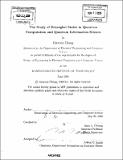The study of entangled states in quantum computation and quantum information science
Author(s)
Chung, Hyeyoun, M. Eng. Massachusetts Institute of Technology
DownloadFull printable version (15.50Mb)
Other Contributors
Massachusetts Institute of Technology. Dept. of Electrical Engineering and Computer Science.
Advisor
Isaac L. Chuang.
Terms of use
Metadata
Show full item recordAbstract
This thesis explores the use of entangled states in quantum computation and quantum information science. Entanglement, a quantum phenomenon with no classical counterpart, has been identified as an important and quantifiable resource in many areas of theoretical quantum information science, including quantum error correction, quantum cryptography, and quantum algorithms. We first investigate the equivalence classes of a particular class of entangled states (known as graph states due to their association with mathematical graphs) under local operations. We prove that for graph states corresponding to graphs with neither cycles of length 3 nor 4, the equivalence classes can be characterized in a very simple way. We also present software for analyzing and manipulating graph states. We then study quantum error-correcting codes whose codewords are highly entangled states. An important area of investigation concerning QECCs is to determine which resources are necessary in order to carry out any computation on the code to an arbitrary degree of accuracy, while simultaneously maintaining a high degree of resistance to noise. We prove that transversal gates, which are designed to prevent the propagation of errors through a system, are insufficient to achieve universal computation on almost all QECCs. Finally, we study the problem of creating efficient quantum circuits for creating entangling measurements. (cont.) Entangling measurements can be used to harness the apparent extra computing power of quantum systems by allowing us to extract information about the global, collective properties of a quantum state using local measurements. We construct explicit quantum circuits that create entangling measurements, and show that these circuits scale polynomially in the input parameters.
Description
Thesis (M. Eng.)--Massachusetts Institute of Technology, Dept. of Electrical Engineering and Computer Science, 2008. Includes bibliographical references (p. 267-274).
Date issued
2008Department
Massachusetts Institute of Technology. Department of Electrical Engineering and Computer SciencePublisher
Massachusetts Institute of Technology
Keywords
Electrical Engineering and Computer Science.